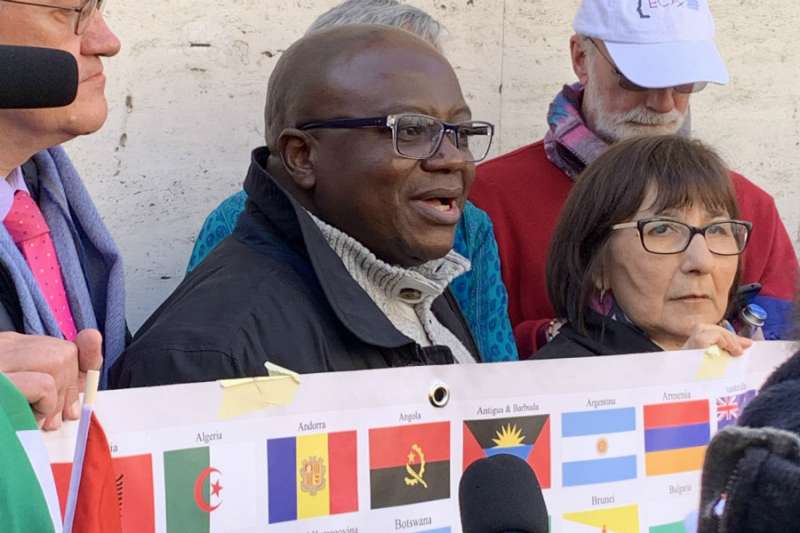While studying at an African minor seminary at the age of 14, Benjamin Kitobo says he was abused by a Belgian priest, who had been sent to Africa after previously abusing children in Europe.
Now as an adult, Kitobo is one of the many sex abuse victims who traveled to Rome to share his story on the sidelines of the Vatican’s Feb. 21 - 24 sex abuse summit where bishops will meet in the presence of Pope Francis to discuss the protection of minors.
Kitobo told CNA at a gathering of victims and advocates from across Africa, Asia, and Latin America outside St. Peter’s Square Wednesday that he is calling for “zero tolerance” for bishops who cover-up sexual abuse, as well as the abusers themselves.
“Zero tolerance … for the people playing into the mechanism of covering up and the people abusing children,” he said, emphasizing that this needs to be “enforceable.”
“I’m addressing Pope Francis to not let the bishop go back home in Africa without any universal law against abusers and bishops who cover up for abuse,” he said.
After Kitobo complained about his abuser at his minor seminary in the Democratic Republic of the Congo, he found out that this priest continued to work with children in Rwanda.
“They didn’t act on this abuser. That is why I am here to complain. Many were treated the same way,” he told CNA Feb. 20.
“Abuse thrives under that kind of taboo when you can’t speak about it,” Kitobo reflected.
Kitobo was joined by sex abuse victims from Jamaica, New Zealand, Great Britain, Mexico, Chile, the United States, and elsewhere, who called for zero-tolerance for both perpetrators and bishops.
Sex abuse victims also spoke to how different countries’ cultures can exacerbate the stigma of speaking about sex abuse and cultivate a culture of silence.
“The culture that exists in society and within the Church in India makes it very difficult for survivors of abuse to come out and tell their stories,” Virginia Saldanha, an advocate for female sexual abuse victims in India explained.
Victims who do speak out “have been effectively silenced,” she continued.
“That is why I … questioned my own cardinal's place on the organizing team of this summit because in his own diocese, he has not addressed a single case successfully,” she said, referring to Cardinal Oswald Gracias of Bombay, one of four members of the Vatican sex abuse summit’s organizing committee.
“I know that the victims that our group has brought to Cardinal Gracias have been silenced,” Saldanha told CNA.
Saldanha began working for the Archdiocese of Bombay in 1991 and later went on to serve as the diocesan secretary for the commission for women, where she particularly tried to get the Church to speak out about societal violence against women.
“I tried to raise awareness but I kept coming up against a wall. I felt that the Church was not serious about this,” she said.
In the years since, the diocese has created a gender policy. “And what do they do with their gender policy? I teach it every year to our seminarians, but that is about it. How effective is it? Not at all,” Saldanha said.
“In India, we've had so many cases of all these great religious teachers abusing women, Hindus also, they have been abusing women,” she said.
“It is not just India, it is all of Asia, the culture is that way … people will not speak out because Confucian culture also says, 'you have to save face' you know? Protect the name of the Church, so when a victim has to speak out, they have to think first how they are going to be affected,” she explained.
"It is a global problem. We know this from survivors around the world,” Peter Isle, director of Ending Clergy Abuse told press before meeting with the Vatican organizing committee for the summit.
“The same obstacles, the same non-transparency, the same irresponsibility that we've seen over and over again by Church officials, that is happening all over the world,” he continued.
“If you had to pick one form of zero tolerance it is this one: zero tolerance for any bishop or cardinal who has covered up for child sex crimes,” Isle said.

